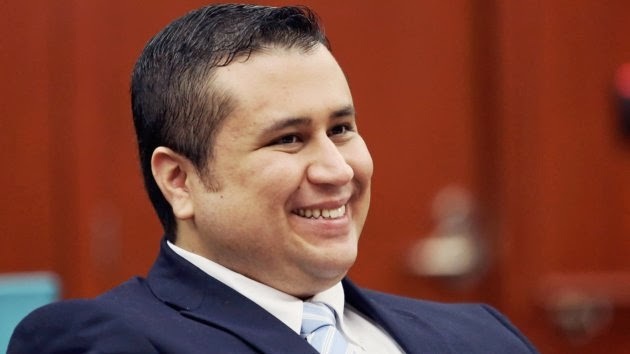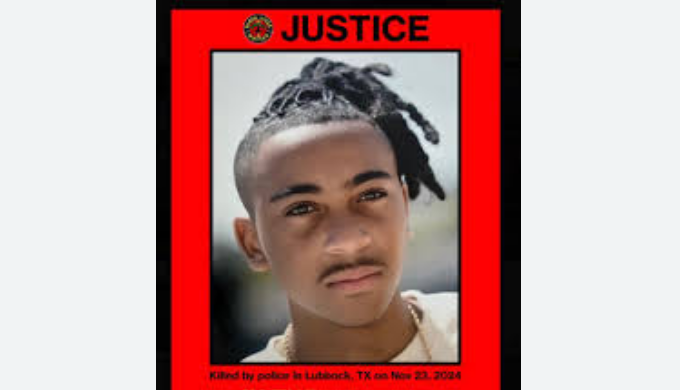Zimmerman: confidence of a man who knew he would walk
[Speaking Truth To Power]
First of a series:
In addition to the several columns already published here, over the next few weeks, in a special series The Black Star News will review the George Zimmerman case to analyze what happened and to question: why did this killer of Trayvon Martin escape justice in Florida?
Was the case against Mr. Zimmerman doomed from the time Florida’s Stand Your Ground law was invoked—especially, since the victim was an African-American who fits the profile of those deemed “the usual suspect” criminals?
To begin analyzing this case, let’s first go back to the awful night of February 26, 2012 in Sanford, Florida. On that fateful night, 17 year-old Trayvon Martin visiting his father, in the gated-community of Twin Lakes, walked to a local convenience store and bought ice tea and Skittles.
On his way back, neighborhood watchman George Zimmerman saw Mr. Martin and decided he was “suspicious.” Zimmerman called 911 and said “We’ve had some break-ins in my neighborhood, and there’s a real suspicious guy…just walking around looking about.” He also told the dispatcher “This guy looks like he is up to no good or he is on drugs or something.”
Many argue the charges of racial profiling in this case are unwarranted. But, given some of the dubious conclusions Mr. Zimmerman came to, it’s clear he did profile Trayvon. The notion he did so because of the way Trayvon was dressed just doesn’t quite cut it. Is wearing a hoodie in the rain so suspicious, or, is it only suspicious when worn by African-Americans? Zimmerman defenders point out it was the dispatcher who first asked the race of Trayvon. That’s true. However, on the 911 tape Zimmerman reiterated, unasked, that Trayvon was a “Black male” possibly armed. The 911 tape gives us clues to the dangerous mindset of Zimmerman—not Trayvon.
Chillingly, Mr. Zimmerman did something NYPD officers, who kill innocent Black men, in New York, often do: he told the dispatcher “he’s coming to check me out, he’s got something in his hands.” Was this the signal from Zimmerman telegraphing his intention to use deadly force against Trayvon? As a criminal justice acolyte, and police wannabe, Zimmerman was surely well aware of justifications used by police when they kill unarmed African-Americans.
Mr. Zimmerman’s next question and statement likely tells us why this tragedy occurred. Zimmerman asked the dispatcher “How long until you get an officer over here?” He then complains “These assholes they always get away.”
A little later he says “Shit he’s running.” This sequence of question and statements gives insight into Mr. Zimmerman’s thought processes. Zimmerman’s comments exhibit a hatred for “these assholes” that “always get away.” And, worrying that officers wouldn’t get there in time, is it any wonder he defied the dispatcher’s order not to pursue Trayvon?
At trial, it was alleged Trayvon attacked Zimmerman, supposedly, after Zimmerman decided to heed the advice of the dispatcher and turn from following Trayvon. Is this believable, especially, given the contradictory statements Zimmerman made?
During his second interview, with lead Investigator Chris Serino, Zimmerman repeatedly insisted he didn’t follow Trayvon. He said he only got out of his car to check the street sign to give cops his location. This is curious since Zimmerman lived at that location for years—and there are only a couple of streets there. And, was it necessary to get out of the car to locate the street name?
It’s not hard to see why Zimmerman abandoned this earlier version of the story. First of all, he must have, eventually, realized the 911 tape would thoroughly refute this tale. If this concoction was to be believed, how would he explain the extended distance between where his truck was parked and where Trayvon body was found? If Trayvon attacked Zimmerman by his truck, how did Trayvon’s body end up so far from Zimmerman’s truck?
In the second interview, with Inspector Serino, Zimmerman when asked about the screaming voice—on another 911 tape recording—stated the screaming voice “doesn’t even sound like me.” During the trial, Zimmerman’s defense was that voice was his. How do you forget something like this? Zimmerman, at some point, obviously, understood if he wasn’t the one screaming for his life, that, this would undermine his fable of being the one under duress—forcing him to fire the fatal shot.
Sanford authorities, initially, declined to press charges against George Zimmerman, supposedly, because his self-defense story couldn’t be challenged. However, it’s interesting to note that on March 13, 2012, Lead Investigator Chris Serino—whose actions and statements are also puzzlingly contradictory—sent an arrest warrant for negligent manslaughter to the State Attorney’s office. The wording of the warrant, in part, states “the encounter between George Zimmerman and Trayvon Martin was ultimately avoidable by Zimmerman, if Zimmerman had remained in his vehicle and waited the arrival of law enforcement or conversely if he had identified himself to Martin as a concerned citizen and initiated dialog in an effort to dispel each party’s concern. There is no indication that Trayvon Martin was involved in any criminal activity at the time of the encounter.”
But State Attorney Norm Wolfinger stated there was insufficient evidence to press charges.
Many claim this case had nothing to do with race, but, that’s hard to square from the facts in this case. If Trayvon was White does anyone think George Zimmerman wouldn’t have been arrested the very night he killed Trayvon? Here’s a question to consider: did Zimmerman’s profiling of Trayvon as a possible Black burglar cloud the minds of Florida law enforcement because of their own perceptions of African-Americans as “usual members” of the criminal class? Is this the reason Zimmerman’s inconsistent statements, his provocatively deadly actions, and, his history of violence were ignored?
In other words the end –eliminating a “usual suspect”– even though wrong in this case, justified the means, even though wrongful and unlawful.
Much was made about Trayvon’s use of marijuana and minor brushes with the law. But why wasn’t Zimmerman’s rap sheet and history—including his violent streak put under the microscope? Let’s look at a few of the violent episodes on Zimmerman’s dossier.
Reportedly, between 2001 and 2005, Mr. Zimmerman worked for two agencies that provided security for parties. Zimmerman was fired from both and according to a former co-worker Zimmerman “had a temper and he became a liability” because he “was like Jekyll and Hyde. When dude snapped, he snapped.”
The co-worker related a particularly violent incident. “One time this woman was acting a little out of control. She was drunk. George lost his cool and totally overreacted… He picked her up and threw her. It was pure rage.”
Was this the same rage animating Mr. Zimmerman when, on the 911 call, he talked about “these assholes” that “always get away?”
In August of 2005, Zimmerman’s former fiancé sought a restraining order against him citing domestic abuse—she said in a fit of jealous rage he slapped her.
In an ironic twist, Zimmerman’s current wife said she may seek a divorce, supposedly, because her husband hasn’t been supportive—even though she was just sentenced to one year probation for committing perjury in lying about their finances during the bail hearing. And Zimmerman’s own cousin—Witness#9—accused him of molesting her for 10 years. It allegedly started when she was six years old and included vaginal penetration with his fingers.
Mr. Zimmerman’s apparent penchant for violence was again on display one month before his former fiancé filed a restraining order. In July, 2005, Zimmerman was arrested for “resisting officer with violence” for fighting with cops who questioned Zimmerman’s friend about alleged underage drinking. Charges were reduced when he entered an alcohol program. Mr. Zimmerman should be glad he isn’t Black. African-Americans who fight cops don’t usually live to kill innocent people later. Did Zimmerman escape serious charges because he’s a judge’s son?
How much thought did Florida authorities give to Zimmerman’s violent past when they were—presumably—assessing whether to arrest him or not? Did they think about him fighting with cops when he flagrantly disregarded the command telling him not to follow Trayvon? Did they remember this past when they listened to him profiling Trayvon as one of these “assholes” who “always get away?”
The truth is if George Zimmerman were African-American it’s doubtful he wouldn’t have been arrested on the spot after this killing.
Given the particulars here, along with Mr. Zimmerman’s history of violence, flagrant disregard for the law, his aggressive actions and statements and inconsistent stories, he should have been arrested from the beginning.
The second column in this series will explore the case further by looking at the appointment of Special Prosecutor Angela Corey, the eventual arrest of George Zimmerman, and some other early evidence in this case, including the other 911 tapes.
Please post comments below.








